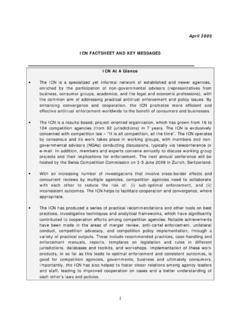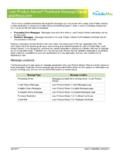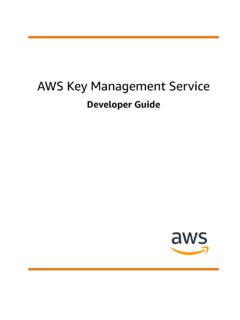Transcription of Corporate Governance and the Financial Crisis: Key ...
1 Corporate Governance and the Financial crisis : Key Findings and Main Messages JUNE 2009 Corporate Governance and the Financial crisis KEY FINDINGS AND MAIN MESSAGES JUNE 2009 ORGANISATION FOR ECONOMIC CO-OPERATION AND DEVELOPMENT The OECD is a unique forum where the governments of 30 democracies work together to address the economic, social and environmental challenges of globalisation. The OECD is also at the forefront of efforts to understand and to help governments respond to new developments and concerns, such as Corporate Governance , the information economy and the challenges of an ageing population.
2 The Organisation provides a setting where governments can compare policy experiences, seek answers to common problems, identify good practice and work to co-ordinate domestic and international policies. The OECD member countries are: Australia, Austria, Belgium, Canada, the Czech Republic, Denmark, Finland, France, Germany, Greece, Hungary, Iceland, Ireland, Italy, Japan, Korea, Luxembourg, Mexico, the Netherlands, New Zealand, Norway, Poland, Portugal, the Slovak Republic, Spain, Sweden, Switzerland, Turkey, the United Kingdom and the United States. The Commission of the European Communities takes part in the work of the OECD. This document was considered by the OECD Steering Group on Corporate Governance and approved for publication on 29 May 2009.
3 OECD 2009 3 Corporate Governance AND THE Financial crisis OECD 2009 This Report and The Way Ahead This report has been developed on the basis of the fact finding study Corporate Governance Lessons from the Financial crisis that the Steering Group issued in February 2009. Its purpose is to further advance the Steering Group s action plan on Corporate Governance and the Financial crisis . The report was discussed at the Steering Group meeting in April 2009, in which representatives from non- member countries such as Brazil, China, India and Russia also participated. When drafting this report, the Steering Group benefited greatly from a public OECD consultation with stakeholders from around the world which took place in Paris on March 18 and from an internet based public consultation which closed at the end of The analysis of major Corporate Governance weaknesses is based on the OECD Principles and summarised in a set of key findings and main messages.
4 These findings will provide the basis for a set of recommendations that will be issued later this year. 1 For a summary of the meeting and the online consultation see 5 Corporate Governance AND THE Financial crisis OECD 2009 Table of Contents Key Findings and Main Messages .. 7 I. The Challenge for Policy Makers and the Steering Group .. 12 II. Remuneration and Incentive Systems: An Old Issue in New Form .. 14 The current controversy .. 14 Models of the determination of remuneration .. 18 The Principles call for transparency, board responsibility and shareholder engagement.. 20 ..that until recently has been the focus of policy 21 Improving transparency in a complex area.
5 21 Involving the shareholders: Say on pay .. 23 Direct control over remuneration in the Financial 25 Going beyond the Financial sector .. 26 However standards are evolving rapidly in response to the crisis .. 27 Key findings and main messages .. 29 III. Risk Management Practices and Standards: A Missing Element .. 31 Risk management has often failed .. 31 The position of the Principles .. 32 Current standards and direction of development .. 33 Sources of additional guidance .. 35 Turnbull guidance .. 37 Other Guidance .. 38 Missing elements .. 38 Key findings and main messages .. 40 IV. Many Signs Point to the Boards: Can They Cope? .. 41 A perfect storm .. 41 Position of the Principles.
6 42 Policy issues and proposals .. 44 Key findings and main messages .. 46 V. Are Shareholders Able to Protect Their Interests? .. 47 A negative assessment of the current situation .. 47 The position of the Principles.. 48 Active shareholders can be encouraged by companies .. 49 Institutional shareholders: The separation of asset management from asset ownership .. 50 Key findings and main messages .. 53 VI. Supporting Effective Implementation .. 55 References .. 56 KEY FINDINGS AND MAIN MESSAGES 7 Corporate Governance AND THE Financial crisis OECD 2009 Key Findings and Main Messages General The Steering Group s analysis of Corporate Governance weaknesses in remuneration, risk management, board practices and the exercise of shareholder rights concludes that, at this stage, there is no immediate call for a revision of the OECD Principles.
7 In general, the Principles provide for a good basis to adequately address the key concerns that have been raised. A more urgent challenge for the Steering Group is to encourage and support effective implementation of already agreed standards. For this purpose, the Steering Group will issue a self-standing commentary with recommendations and emerging good practices in the four areas that it has identified as most immediately linked to the Financial crisis . A first set of key findings and main messages to be included in such a self-standing commentary is presented below. The commentary should be developed with a view to update the Assessment Methodology and the possible need for a future review of the Principles themselves.
8 The OECD will establish a mechanism for peer reviews in the area of Corporate Governance , which can support the Financial Stability Board s initiative to promote peer reviews based on the 12 key International Standards and Codes. The peer reviews will be designed to encourage transparency, consistency and learning. The peer-reviews can also address specific cross-cutting issues that will identify key market and policy developments that may influence the quality of Corporate Governance . The purpose of such reviews would be to raise awareness about the possible consequences of these developments and provide a forum for dialogue about country practices and experiences in tackling new challenges.
9 Governance of the remuneration process The Governance of remuneration/incentive systems has often failed because negotiations and decisions are not carried out at arm s length. Managers and others have had too much influence over the level and conditions for performance-based remuneration with boards unable or incapable of exercising objective, independent judgement. In many cases it is striking how the link between performance and remuneration is very weak or difficult to establish. The use of company stock price as a single measure for example, does not allow to benchmark firm specific performance against an industry or market average.
10 8 KEY FINDINGS AND MAIN MESSAGES Corporate Governance AND THE Financial crisis OECD 2009 Remuneration schemes are often overly complicated or obscure in ways that camouflage conditions and consequences. They also tend to be asymmetric with limited downside risk thereby encouraging excessive risk taking. Transparency needs to be improved beyond disclosure. Corporations should be able to explain the main characteristics of their performance related remuneration programs in concise and non-technical terms. This should include the total cost of the program; performance criteria and; how the remuneration is adjusted for related risks.
















